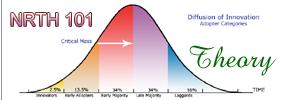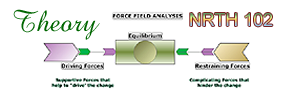
The short 3 credit hour courses in this series introduce various significant theories and frameworks that are relevant to nursing informatics knowledge, skills, and applications. This particular course focuses on the Novice to Expert Theory.
- Teacher: June Kaminski
- Teacher: June Kaminski

The short 3 credit hour courses in this series introduce various significant theories and frameworks that are relevant to nursing informatics knowledge, skills, and applications. This particular course focuses on the Diffusion of Innovation Theory.
- Teacher: June Kaminski
- Teacher: June Kaminski

The short 3 credit hour courses in this series introduce various significant theories and frameworks that are relevant to nursing informatics knowledge, skills, and applications. This particular course focuses on the Lewin Change Management Theory.
- Teacher: June Kaminski
- Teacher: June Kaminski

This short 3 CE credit course introduces nurses to David Cooperrider's inspirational theory for organizational motivation and planning applied to informatics implementation. Appreciative Inquiry (AI) is a capacity building approach that selectively seeks to locate, highlight, and illuminate the life-giving forces within an organization or community. AI seeks out the best of "what is" to help ignite the collective imagination of "what might be".

This short 3 CE credit course introduces nurses to Usability Theory which is an important topic in nursing informatics and nursing in general, since Usability is a key consideration when using technology and equipment in health care. Usability is an important consideration when assessing the utility and user-friendliness of any piece of equipment including technology in the workplace or home.
- Teacher: June Kaminski

This short 3 CE credit course introduces nurses to the DIKW theory which outlines the importance of the four dimensions of data, information, knowledge, and wisdom in informatics. The DIKW theory, short for Data – Information – Knowledge – Wisdom has evolved over the years across a variety of disciplines and is one of the most embraced in nursing informatics.
- Teacher: June Kaminski

This 1 module (3 CE credit) course introduces nurses to the McKinsey 7-S Framework which outlines the importance of seven key elements in organizational planning and change: Shared Values, Structure, Strategy, Skill, System, Style, and Staff. It is a model that is well suited to healthcare change, including information technology integration planning, since it guides users to apply a holistic approach to planning.

This 1 module (3 CE credit) course introduces nurses to the Prosci ADKAR Model which provides a guide for leaders to support individual change within organizations. The focus of this model is on the individual person, since all successful change occurs at the personal level where people involved in the change move through stages of acceptance and action. ADKAR is an acronym for the five stages of the model which include Awareness, Desire, Knowledge, Ability and Reinforcement.
- Teacher: June Kaminski

This 1 module (3 CE credit) course introduces nurses to the Socio-Technical Theory which consists of three main dimensions or subsystems: social (people, culture, goals), technical (technology, infrastructure, processes), and the environmental dimension that enfolds the first two. Ideally, thought and resources are applied to ensure all three subsystems interact together smoothly and harmoniously.
- Teacher: June Kaminski
